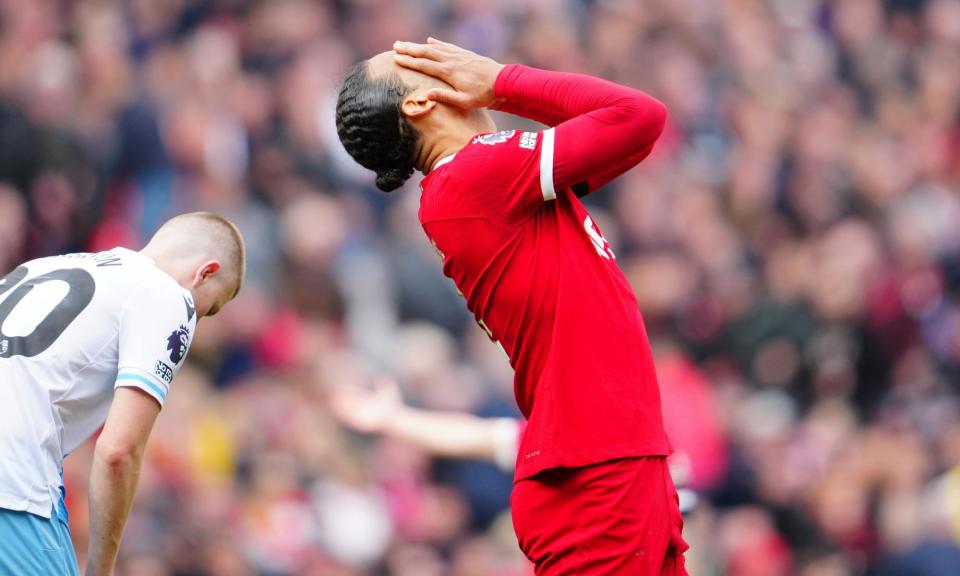Weary Liverpool’s title push close to petering out as familiar errors return

A corner, nine minutes after half-time. A clutch of players jump together. The ball drops eight yards out. Darwin Núñez pivots. All he has to do is keep it low. All he has to do is get it on target. He does keep it low, he does get it on target. But the ball hits the right knee of Dean Henderson, the Crystal Palace goalkeeper, and bounces wide for a corner. Was that the moment the title was lost?
It wasn’t, of course, in part because no season ever truly comes down to just one moment – and Liverpool anyway could yet come back. Even after that chance, in this game, there were other glorious opportunities that dribbled away. Diogo Jota hit Nathaniel Clyne with the goal otherwise open. Curtis Jones, sent through one on one, sliced wide. Harvey Elliott had a header saved. Mohamed Salah had an effort blocked by Tyrick Mitchell.
Related: Liverpool suffer huge blow to title hopes after Eberechi Eze gives Palace win
But that Núñez chance was key because it was Núñez, who has become one of those figures it’s impossible to discuss without becoming embroiled in some wider debate, and debate about the debate, and because that was the moment when it became clear that this was going to be one of those days when the ball just wasn’t going to go in. Crystal Palace have conceded 10 goals in stoppage time this season, but they never looked like conceding one at Anfield.
Only Chelsea in the top half of the table have underperformed their xG by more than Liverpool, whose attacking woes become less and less comprehensible. Opta had their xG for the game at 2.87, the most they’ve had without scoring in the 14 seasons the data has been collected. How can a team that, at its best can seem so irresistible, suddenly be rendered so fallible, so diffident? It’s not as straightforward as blaming Núñez or Luis Díaz or the fact that Salah has returned from injury moving with all the ease of Tiger Woods on a Sunday.
As well as the issues with converting chances in certain key games, Liverpool concede the first goal far too often. Eberechi Eze’s 14th-minute goal was the 21st time this season Liverpool have conceded first. They are the masters of the comeback, having picked up 27 points from losing positions this season, which is all very laudable, but life would be a lot easier if they didn’t keep setting fires they then have to put out.
Thursday’s 3-0 Europa League defeat to Atalanta was one of those results that feels shocking as it is happening but with hindsight becomes rapidly explicable. Liverpool had not been anywhere near their best in beating Brighton 2-1, when they conceded first, or in beating Sheffield United 3-1, when they conceded a glaring first-minute chance that was missed and then an equaliser from nowhere.
The lack of a second goal in the first half against Manchester United, in the context of their FA Cup defeat at Old Trafford, always felt like an invitation to the fates – and the fates are rarely crueller than when you’re already knackered.
It’s not that Jürgen Klopp’s side have played particularly badly in any of those games. They had the better of all of them, as they did in the Cup against United and the home league game against Manchester City. But they missed chances and conceded soft goals. There’s been a laxity in both boxes. It’s not one thing, not one player. It’s too simple to say it’s fatigue after a long season, a tightening up in the run-in or a loss of confidence as results have begun to deteriorate.
Rather it’s all of them and more, a weariness of body and mind that has sapped their self-belief and sharpness. The situation is not as acute as it was for Arsenal last season, because Liverpool’s squad is better and deeper, but it is not dissimilar. Those big dramatic victories, such as Liverpool enjoyed against Chelsea in the League Cup final, or against Newcastle home and away, have a cost. Even moments like Alexis Mac Allister’s goal to turn the game against Sheffield United take their toll. No team can just keep on going to the well, no side has boundless reserves of emotional energy.
In the first half, Liverpool misplaced 63 passes, more than in any other game this season. The Palace opener came after a move of 21 passes during which time Liverpool got nowhere near them. Yes, Liverpool again missed chances before half-time, denied by the bar and a fine save from Henderson, but Palace looked dangerous every time they broke, which was often. The press that had seemed to be back near its best this season was misfiring again.
Somehow all the wheels have all come loose at once. Even if Klopp can tighten everything up again, one point from the last two games means it’s probably too late.

